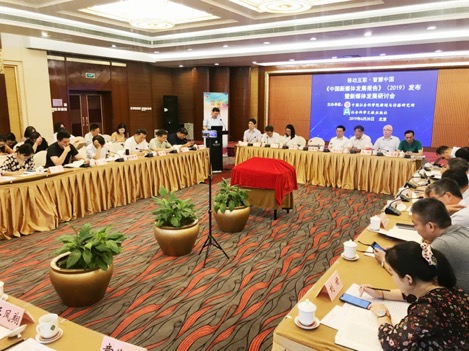Blue Book of New Media: Ten Trends Forecast of New Media Development in China

Event site (Liu Chunyu/photo)
CCTV News (Reporter Tang Shiying Liu Chunyan) On June 25th, the Institute of Journalism and Communication of China Academy of Social Sciences and Social Science Literature Publishing House jointly released the Blue Book of New Media: China New Media Development Report No.10(2019).
The Blue Book predicts ten trends of new media development in China.
First, the digital economy has become the core driving force for China’s high-quality economic development.
According to the data in the White Paper on the Development and Employment of Digital Economy in China, the scale of China’s digital economy reached 31.3 trillion yuan in 2018, with a nominal increase of 20.9% in terms of comparable caliber, accounting for 34.8% of GDP. Digital economy is an important measure to achieve sustainable and high-quality economic development, in which the Internet and new media industries show great development potential. The development of China’s new media will be closely related to digital life and digital economy, grasp the dividend of digital economy and enhance the core competitiveness of the country.
Second, artificial intelligence and 5G commercialization will open a new era of intelligent interconnection.
Driven by 5G and artificial intelligence technology, the video industry, Internet of Things and industrial Internet will all be upgraded in a new round, and people’s information acquisition, working methods and living habits will also undergo subversive changes. Internet technology is more closely related to people’s lives, and "intelligence+"has greatly improved people’s sense of network acquisition and happiness.
Third, the network video industry represented by short video has a strong development momentum.
In the next few years, online video will continue to maintain a strong development momentum. In order to meet the needs of users, the online video industry will continue to develop some new business forms, such as streaming video services. The rise of short video platforms will drive the rapid development of related industries and innovate information dissemination methods. For example, the Tik Tok platform will make the city image more flexible, diverse and humane, and will also provide more ways for users to participate.
Fourth, the industrial Internet is booming, and traditional industries are accelerating digital transformation and upgrading.
In 2019, the International Telecommunication Union (ITU) officially released the first international standard "Methodology for Building Sustainable Competitiveness in the Process of Digital Transformation of Enterprises". According to the data of the Ministry of Industry and Information Technology, nearly 14,000 enterprises in China have acquired new capabilities in building an information environment according to the methods provided by this standard. It can be expected that on this basis, traditional industries such as China’s manufacturing industry will accelerate the digital transformation, and the industrial Internet will flourish.
第五,互联网巨头多向布局,竞争边界模糊
2018年,互联网行业迎来上市潮。据艾瑞网统计,截至2018年12月14日,上市的国内互联网企业有爱奇艺、美团点评、小米集团、拼多多等64家。继BAT之后,今日头条、美团、滴滴被称为互联网行业新三巨头,缩写为TMD。2018年,拼多多、趣头条、快手等应用在“下沉市场”的亮眼表现也加速了互联网巨头的对外投资、并购步伐。随着大型互联网企业全面开展业务收购和多方位布局,互联网企业间的竞争边界将日趋模糊。
第六,网络空间主流意识形态建设将得到进一步加强
2018年8月召开的全国宣传思想工作会议等重大会议,对意识形态工作做出了顶层设计、长远规划。习近平总书记在主持中共中央政治局第十二次集体学习时指出,我们要加快推动媒体融合发展,使主流媒体具有强大传播力、引导力、影响力、公信力,形成网上网下同心圆,使全体人民在理想信念、价值理念、道德观念上紧紧团结在一起,让正能量更强劲、主旋律更高昂。这对互联网内容建设提出了根本要求,也对网络内容建设做出了指导。
Seventh, information consumption will become one of the most dynamic consumption fields.
According to the China Internet Industry Development Report (2018), in 2018, the scale of China’s information consumption market continued to expand, and the scale of information consumption was about 5 trillion yuan, up 11% year-on-year, and the proportion of information consumption in GDP increased to 6%. In August 2018, the Ministry of Industry and Information Technology and the National Development and Reform Commission issued the "Three-year Action Plan for Expanding and Upgrading Information Consumption (2018~2020)", proposing that the scale of information consumption in China will reach 6 trillion yuan by 2020. In 2019, China’s information consumption will maintain a rapid development momentum, continuously improve the quality of new information products and information technology services, and promote economic transformation and development.
Eighth, the new retail is developing towards deep digitalization.
With the continuous application of Internet of Things, big data, artificial intelligence and other technologies in the retail field, new retail digitalization will continue to advance. At present, some new retail stores or business areas have achieved some results, but the whole industry still lacks deep changes such as the transformation to digital management. The new retail emphasizes the intelligence of retail, which puts forward clear requirements for the intelligence of the whole chain of product procurement, sales and service. The new retail needs to open up the chain of product supply, logistics and sales, iterate the business model, and provide users with quality service experience.
Ninth, the fan economy has become an important business model of the Internet economy.
In April 2019, Ruhan Holdings, known as the first share of online celebrity e-commerce, went public in the United States. The economic power of fans created by the Internet is enormous. Although the channels for realizing cash are constantly expanding and changing, the core of the fan economy still maintains a high vitality. The Internet magnifies the individual value, and different platforms such as Weibo and Tik Tok have created the comprehensive ecology of idolize, and this online traffic can be quickly realized offline. Relying on precise operation and good user experience, the ways to realize the fan economy will be more diversified.
Tenth, online poverty alleviation continues to deepen.
In May 2018, the Ministry of Industry and Information Technology issued the "Implementation Plan for Promoting Internet Poverty Alleviation (2018~2020)", which made clear arrangements for promoting broadband access in poor villages and strengthening network application in poor areas, and proposed to improve the effectiveness of online poverty alleviation through rural e-commerce, distance education and telemedicine. With the approach of building a well-off society in an all-round way in 2020, the process of network poverty alleviation will be further accelerated, and the role of enterprise entities represented by Internet companies in network poverty alleviation is becoming increasingly prominent.
(See Blue Book of New Media: China New Media Development Report No.10 (2019) P26-28, Social Science Literature Publishing House, June 2019).